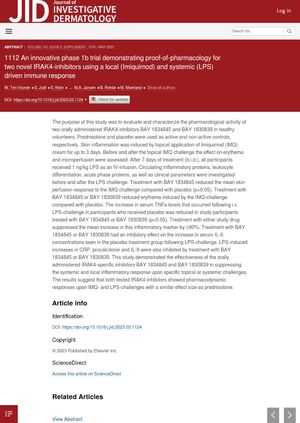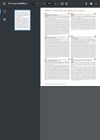An Innovative Phase 1b Trial Demonstrating Proof-of-Pharmacology for Two Novel IRAK4-Inhibitors Using a Local and Systemic Driven Immune Response
April 2023
in “
Journal of Investigative Dermatology
”

TLDR Two new IRAK4-inhibitors effectively reduced skin inflammation and immune response markers in healthy volunteers.
The study evaluated the pharmacological activity of two orally administered IRAK4-inhibitors, BAY 1834845 and BAY 1830839, in healthy volunteers. Skin inflammation was induced by topical application of Imiquimod (IMQ) cream, and the effects on erythema and microperfusion were assessed. After 7 days of treatment, all participants received 1 ng/kg LPS as an IV-infusion, and various inflammatory and clinical parameters were investigated. The results showed that treatment with BAY 1834845 reduced the mean skin perfusion response to the IMQ challenge compared with placebo, and both BAY 1834845 and BAY 1830839 reduced erythema induced by the IMQ-challenge compared with placebo. Both drugs also reduced the increase in serum TNFa levels following the LPS-challenge, and suppressed the mean increase in this inflammatory marker by ≥80%. They also inhibited the increase in serum IL-6 concentrations, CRP, procalcitonin, and IL-8 seen in the placebo treatment group following LPS-challenge. The study concluded that both IRAK4-inhibitors were effective in suppressing the systemic and local inflammatory response upon specific topical or systemic challenges, with a similar effect size as prednisolone.




